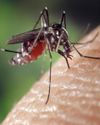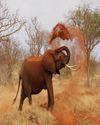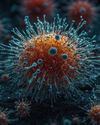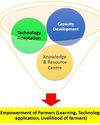
It is the leading cause of death worldwide and in India, it is the second biggest killer after heart disease. According to the WHO Global Cancer Observatory report in 2020, cancer affected approx. 18 million lives in the world, and 1.32 million cases were reported in India where a major portion was shared by women. Among different types of cancer, oral, breast, lung, and cervical cancer are the most prevalent ones affecting human beings.
Knowing cancer
The word cancer came from the Greek word cancrum which means crab. It occurs when cell division in the body becomes undesirable, uncoordinated, and uncontrolled. Contrasting to normal cells, cancer cells have an irregular shape, uncontrolled and rapid growth, a darker and larger nucleus, an acidic cell environment, a craving for large amount of glucose, and proclivity for survival without oxygen. Cancer cells have mutated DNA sequences and as a sequel to this, the cells begin to divide and replicate at a much faster rate and lead to the development of abnormal lumps known as tumors. A cancerous tumor has billions of cancer cells and it has to divide thousand times when it can be felt by hand or become visible on an X-ray plate. Tumors are generally of 2 types:
This story is from the November - December 2022 edition of Scientific India.
Start your 7-day Magzter GOLD free trial to access thousands of curated premium stories, and 9,000+ magazines and newspapers.
Already a subscriber ? Sign In
This story is from the November - December 2022 edition of Scientific India.
Start your 7-day Magzter GOLD free trial to access thousands of curated premium stories, and 9,000+ magazines and newspapers.
Already a subscriber? Sign In

An insight into Chandipura virus in India
Recently lot of news regarding disease due to Chandipura virus has emerged in various newspapers/magazines. After reading the reports published it seems that thing is still brewing in the natures nest and it could affect mankind.

Why elephants never forget?
An elephant has a very large brain for its size and the 'temporal lobe' region responsible for memory is more developed with a greater number of folds - this results in powerful abilities to 'download' important survival data such as where to find food and water, and who is friend or foe.

Use of Algae for Wastewater Treatment Containing Heavy Metals
Wastewater treatment is a critical environmental issue particularly when it comes to the removal of heavy metals.

Nano priming Seeds: A Small Innovation Sparkling Big Advances in Germination
Nanopriming is an emerging agricultural technique where the seeds are treated with nanoparticles to improve their germination, growth, and overall performance.

Nobel Laureates in Physics 2024: Revolutionizing AlThe Physics Foundations Behind Machine Learning
This year's two Nobel Laureates in Physics have used tools from physics to develop methods that are the foundation of today's powerful machine learning.

Revolutionizing Biology: The 2024 Nobel Prize in Chemistry Celebrates Breakthroughs in Protein Design and Structure Prediction
The Nobel Prize in Chemistry 2024 is about proteins, life's ingenious chemical tools.

New findings on animal viruses with potential to infect humans
Scientists investigating animal viruses with potential to infect humans have identified a critical protein that could enable spillover of a family of organisms called arteriviruses.

Father-Daughter Team Decodes Mars' Alien Signal
There is no definitive answer to whether aliens exist, but there is a lot of work being done to find out:

Krishi Vigyan Kendras: Working for Farmer's Welfare
Krishi Vigyan Kendras (Farm Science Centres) are the District level institution serving as an agriculture knowledge resource & capacity development centre which plays indispensable role in front line extension regarding agriculture system in scientific way.

Sixth generation Computer: The future computing technology
We are in a transition towards a digital world, where everything will be dealt with in digital format.